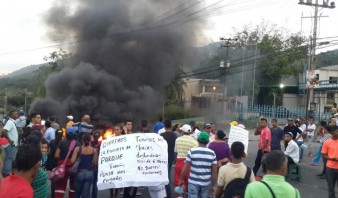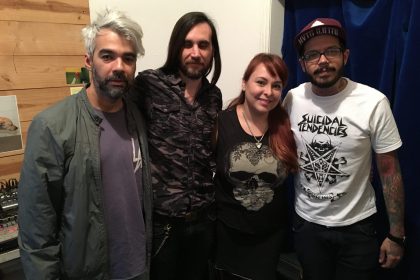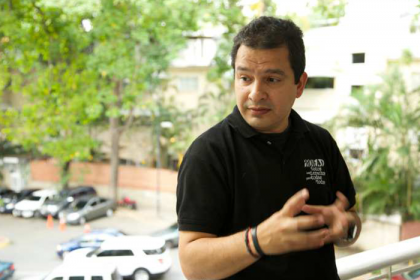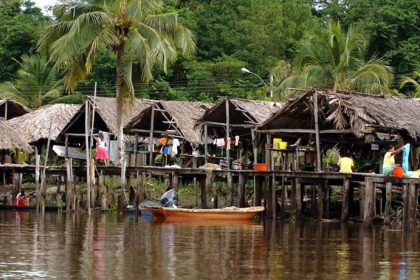
Durante la apertura de la sesión del Consejo de Derechos Humanos de las Naciones Unidas que tiene lugar en Ginebra, realizada este lunes 15.06.15, el Alto Comisionado para Derechos Humanos (OACDH), Zeid Ra’ad Al Hussein, dedicó unos minutos de su discurso para referirse a la preocupante situación venezolana en la materia.
Al Hussein expresó sobre nuestro país: «En Venezuela, estoy seriamente preocupado por la legalidad y condiciones de las personas que han sido detenidas por ejercer pacíficamente la libertad de expresión y de reunión. Algunas han estado en huelga de hambre durante semanas, lo cual se suma a nuestra preocupación. Deben ser liberadas sin demora y sin condiciones. También estamos preocupados por el acoso, las amenazas y la descalificación pública de defensores y defensoras de derechos humanos, especialmente aquellos que han viajado al extranjero para dar su testimonio ante mecanismos de derechos humanos de la ONU y regionales. Yo y mi Oficina permanecemos dispuestos a interactuar con las autoridades y otras partes interesadas para garantizar que se respeten los derechos humanos de todos los venezolanos, y a definir un camino positivo hacia adelante.»
De esta manera el Alto Comisionado para Derechos Humanos de la ONU se suma a las personalidades internacionales que han elevado su opinión de manera pública sobre el debilitamiento democrático y de derechos humanos que ocurre en Venezuela.
A continuación, publicamos en idioma inglés el texto íntegro de la intervención de Zeid Ra’ad Al Hussein:
STATEMENT BY UN HIGH COMMISSIONER FOR HUMAN RIGHTS ZEID RA’AD AL HUSSEIN AT THE 29TH SESSION OF THE HUMAN RIGHTS COUNCIL IN GENEVA, 15 JUNE 2015
Mr. President,
Excellencies, Colleagues,
Geneva (Issued as received) – Seventy years after the founding of the United Nations, what can we conclude about our achievements in the protection and promotion of human rights? That we have protections today, in the form of treaties, national legislation and their implementation – and all supported by a broader awakening of the hitherto tranquilized parts of the human conscience, whether it be in the realization of women and children’s rights, for example, or the right to food security or health; all are a sign, indisputable signs, of a better human world. And this, when separated from everything else we see around us – the wars and deprivation around us – we can and should celebrate, for they, our achievements, are considerable.
Yet it is the nagging persistence of “the everything else” which leaves us deeply worried. It shows the unmistakable signs of a growing abandonment, of a headlong retreat, by too many States, who seem to be taking leave of their respective commitments to uphold those obligations. We live in an age of contradictions, or contrary motions, where improvements and regressions collide to obscure certainty, cloud the future, giving rise to our present-day anxieties. Simply put, too many of us live among brutal conflicts, and are threatened by greed, ambition and contempt for human life. Too many are still denied their economic and social rights, and the result is suffering on a colossal scale. Discrimination so severe and pervasive still, that it deprives too many people of the means of existence. Repression that stifles the human voice, and breaks the spirit, is also still too evident.
And so the people of this world yearn desperately for decisive moral leadership from your leaders and your countries: a leadership based on principle, law and humility. And not just from your leaders. We in the UN must do so too. My own conduct, and the conduct of my Office, must always accord with the highest standards of professional integrity in relation to those who suffer. We must always be sensitive and act sensitively where their rights have been violated. In recent weeks, there has been much criticism of the UN made by a number of observers, and specifically of my Office and its leadership, in respect of how we handled allegations of appalling child abuse in the Central African Republic last year. The conduct which drew the criticisms deserves judgement, and I support the Secretary-General’s decision to establish an external review in which those criticisms and the conduct will be examined and judged. I will accept the result, and abide by its findings, of course, whether they relate to my Office or my own conduct in this matter. We must all be held to account, with no exceptions. And we must all be guided always by the needs of victims in our thoughts and deeds. It is the rights of those who suffer from discrimination, deprivation and violence, that must occupy centre-stage in every aspect of our work – in this chamber and outside of it. The more they suffer, the more we must focus on them.
The member states must show this leadership too. It is of deep concern to me, and my Office, when court orders are issued by the ICC in respect of the serving head of state of Sudan, and State Parties to the Rome Statute openly flout them. In this regard, we await the ruling of the Pretoria High Court this morning, as it assesses the request submitted by the ICC.
Mr. President,
I am often told in this chamber, in our debates, that I should not be «naming and shaming» member states. Somehow the naming is, or has become, the very shame itself. This is a disfigurement of the truth, which we must now reset. The shame comes not from the naming: it comes from the actions themselves, the conduct or violations, alleged with supporting evidence or proven. The greatest factory of shame is the blanket denial of human rights. The denial of the right to life shames unreservedly. Killing on a massive scale, shames stunningly, and inexhaustibly. The denial of the right to development also shames. The denial of human dignity shames. Torture shames. Arbitrary arrests shame. Rape shames. We name; the shame of States, where it exists, has already been self-inflicted. The loss of face for the affected countries has come well before OHCHR raises its independent voice. We say what we believe to be the truth, on behalf of victims. We have no monopoly over truth, but we believe our contentions can be supported by fact.
Mr. President,
Political turbulence, repression, violence and war have become so widespread that they impel millions of the world’s people to risk their lives to find a place of relative safety. Migration is the symptom; the cause is despair, after repeated human rights violations have stripped an individual of all hope of justice and dignity. I am heartened that later today this Council will address the human rights of migrants. Your leadership on this issue will be vital, particularly in terms of the multiple crises regarding migrants en route to Europe, South-East Asia and Australia.
Mr President,
The conflict in Syria is the most mind-numbing humanitarian crisis of our era, and the magnitude and nature of its human rights violations pose a defining test of what we so often term the international community. After more than four years of a sustained campaign of terror directed by the Government against its own people, and the rise of non-State actors capable of the most appalling horror, this conflict has killed at least 220,000 women, men and children and blighted the lives of countless others. It has forced the largest movement of people since the Second World War, with well over 7 million people displaced within the country and 4 million fleeing it. If the words «international community» are to mean anything, they must mean that we collectively bring assistance and protection to the Syrian people.
The entire country has become a war-zone. Three out of four Syrians now live in poverty. Half of all school-age children are deprived of education or adequate nourishment and warmth. Allow me to quote one 15 year-old living in Aleppo: «We are living in a horror movie — attacks, torture, assassinations, kidnappings, sieges, refugees, explosions, missiles, snipers, and finally ruins above the house, and all down the road…The most horrible thing is there are no bulldozers to clean up the ruins: people die in the rubble and nobody saves them.» «We are living in a horror movie»: it may be impossible to imagine the anguish and the terror of Syria’s children.
The Secretary-General, in his latest monthly report to the Security Council, writes, «The level of carnage and devastation throughout the Syrian Arab Republic should shock the collective conscience of the world.» His Special Envoy, Staffan de Mistura, continues his consultations with Syrian, regional and international actors, and I deeply hope that they will pave the way for peace. Any agreement must be focused on the human rights of all the Syrian people, and the need to repair the fissures between ethnic and religious communities who for decades before this crisis lived in mutual respect.
In this room are the representatives of many States with influence in the region, including regional and global powers. I urge you to exert that influence, singly and collectively, to reverse the living nightmare that Syria has become for its people, and to encourage more constructive choices by all actors. I particularly welcome the recent call by the Government of the Russian Federation for accountability regarding allegations that barrel bombs filled with chlorine gas have been used. All sides must be held accountable for violations. There will never be sustainable peace where impunity prevails.
I am also deeply concerned by the ongoing deterioration of human rights and the humanitarian situation in Iraq. The Takfiri group ISIL continues to perpetrate the most despicable abuses on the Iraqi people under its control, in particular women, children and minorities, and has added to these crimes the deliberate destruction of monuments, which symbolize the deep roots and cultural and religious identity of many communities. The Iraqi government has made commitments to hold to account all those who have committed human rights violations – including, but not limited to, so-called ISIL – and this is welcomed. Countering extremism and addressing sectarian violence will require more than military action. We stand ready to assist the government to promote the rule of law and good governance; increase accountability; encourage community reconciliation; and ensure respect for the rights of minorities and of women.
Meanwhile, more than half of the humanitarian assistance that is brought to over 8 million people in Iraq by UN operations may very soon be cut off, because States will not fund it. This is shameful.
Mr President,
In Libya, armed groups continue to engage in violent clashes using heavy weaponry, and indiscriminate shelling of residential neighbourhoods, as well as attacks on protected sites, have resulted in numerous civilian casualties. Large numbers of civilians have been abducted and tortured by all sides because of their actual or perceived ethnic or religious origin, opinions, family ties or political affiliation, and many have died in custody – possibly summarily executed or tortured to death. Detention of migrants, asylum seekers, and refugees is widespread and prolonged, involving multiple violations of their rights. I am very concerned about their disastrous situation, as well as that of other vulnerable groups, including detainees and the internally displaced. This Council has requested that I despatch an investigative team, and we will report on its findings in March.
In Yemen, I am gravely concerned about the high number of civilian casualties. My Office has received information suggesting that indiscriminate and disproportionate attacks are being used on densely populated areas, including the attack on the Al Mazraq camp. Such attacks must be thoroughly investigated, and greater protection of civilians must be ensured by all sides. By now well over 20 million people are in need of assistance, and conditions in Yemen are described by OCHA as catastrophic. It is urgent that all sides ensure safe access of humanitarian agencies to affected areas, and the blockade on imports of food, medicine and fuel should be lifted immediately.
Mr President,
Much of the Middle East is now engulfed in violence, and this ferocity is spreading. Several governments in the region are fearful of extremist threats. Widening outwards, to Somalia, Nigeria and Mali, we also see horrific abuse of human rights by Takfiri groups. But repressing human rights is not a solution to these conflicts: it is a contributing cause.
Crackdowns and repression are counterproductive. I remind you that in March 2011, my predecessor warned that the use of firearms against peaceful protestors in Syria «risks creating a downward spiral of anger, violence, killings and chaos.» The authorities chose to ignore that advice, and the results are painful to behold.
When governments attack civil society, they undermine the foundations of stability and prosperity. A tight grip on freedom of expression, crackdowns on peaceful protest, massive detention and even torture, denial of economic and social rights – these are the soil on which extremist groups flourish. They create opportunities for extremist or sectarian movements to step in and fan the flames of rage.
In particular, policing and security forces must embody the rule of law – or fail. It is they who are often seen as the face of the State. When security forces act with contempt for people’s rights, treating them as enemies, then enemies are what they may become. Every act of torture contributes to extremism; and every arbitrary arrest and abusive crackdown – every act that represses civil society and legitimate dissent – is a step towards further violence.
Respect for human rights offers States a path towards greater stability, not less. Dialogue and respect for human rights, including the rights of minorities, build confidence and loyalty as well as thriving political and economic institutions.
Mr President,
I am concerned that in Egypt, cursory mass trials without adequate procedural guarantees have resulted in the imposition of the death penalty on hundreds of people since March 2014; seven have been put to death so far. It is time for a moratorium on the death penalty. We have also received reports of torture in interrogation centres, and I urge the authorities to thoroughly investigate these allegations, with appropriate action. The State should also end the practice of mass arrests and mass prosecutions, and release all those who are currently detained in connection with peaceful protest. It is important to appreciate that counter-terrorism efforts will not bear fruit unless measures are also taken to address socio-economic grievances, to strengthen good governance, and to promote rule of law and human rights. Egypt’s rich culture is threatened when civil society and human rights defenders are under attack.
In Bahrain, dozens of detainees have reportedly suffered torture and ill treatment, including in Jou prison, and I urge an immediate investigation into these allegations. All those detained in connection with their peaceful activities should be released. The way forward to ensure peace, stability and prosperity for all Bahrainis is through genuine dialogue between the Government and the opposition, without preconditions.
I am also concerned by the human rights situation in the Occupied Palestinian Territory. This year, UNRWA marks its 65th year, and sadly its work continues to be needed. In Gaza, the longstanding blockade and slow reconstruction is generating more poverty, and has further undermined economic and social rights. I fear this may create the conditions for renewed violence. Gaza needs not just physical reconstruction, but the reconstruction of hope; development, accountability and respect for human rights are a counterweight to violence and extremism. The Commission of Inquiry in respect of Gaza will be releasing its report for the Council’s consideration at this session. It is my hope the report will pave the way for justice to be done to all civilians who fell victim to the fighting last year, by holding to account those alleged to have committed grave and other serious violations of international humanitarian law, through investigation and where required, prosecution.
I am also disturbed by all the pending demolition orders affecting Palestinians in the Occupied Palestinian Territory, including East Jerusalem. The continued presence and expansion of Israeli settlements and related activities, as well as settler violence, remain at the core of most of the violations of human rights in the Occupied Palestinian Territory, including East Jerusalem, and I repeat my calls to Israel to end immediately the expansion of the settlements, and to address settler related-violence.
I have recently briefed this Council about my growing alarm regarding the situation in Burundi, where Presidential, local and parliamentary elections have been postponed. The increasingly violent actions of the Imbonerakure militia have accentuated my concerns, and I urge the authorities to take measures urgently. I also recently briefed the Council on South Sudan, where my acute concern has not abated. Eighteen months of devastating conflict have been marked by brutal violence against civilians, with disturbing reports of children being killed, raped or recruited into armed forces by both sides – most recently a report of 95 children being killed in recent violence. I urge the Council and the entire international community not to lose sight of this ongoing tragedy, and to seek decisive steps to end the fighting.
This afternoon we will examine more deeply the factors that drive so many millions of people to leave their homelands. I am particularly concerned about the persecution of the Rohingya community in Myanmar. I believe the time has come for the Human Rights Council to probe more deeply into the nature and scope of these violations, and how they might more effectively be addressed.
Later in the course of this month’s session we will discuss the human rights situation in countries affected by Boko Haram. Civilians in northeast Nigeria and neighbouring countries bordering Lake Chad have been living through horrifying acts of cruelty and violence by this group, especially women and girls. Their plight is compounded by extremely worrying reports of violations of international human rights and humanitarian law by the very armed forces that should protect them.
The Commission of Inquiry on Eritrea will present its findings and recommendations during this session. I urge you to consider these recommendations carefully, together with those of the Special Rapporteur on the human rights situation in Eritrea which will also be presented at this session, with a view to ensuring implementation, and the promotion and protection of human rights for all Eritreans.
I deplore the serious human rights violations and abuses that continue in eastern Ukraine, in particular in the areas controlled by armed groups. Persistent reports indicate continuing flows of arms and fighters from the Russian Federation, and the creation of parallel structures not in line with the Minsk Agreement, the Ukrainian Constitution or international law also contribute to the situation. The large and growing numbers of IDPs and refugees confirm that there has been considerable impact on the human rights of millions of people throughout Ukraine. The same is true of the Autonomous Republic of Crimea, the status of which is prescribed by General Assembly resolution 68/262.
In the Russian Federation, the new Federal Law No. 129-FZ will allow authorities to declare foreign and international organizations “undesirable”, and shut them down, if they are perceived as presenting a threat to Constitutional order, to state security, or to defence. I note that the Commissioner for Human Rights of the Russian Federation has raised her own concerns about the possible negative implications of the law. For our part, we are concerned that as presently worded, this law may be open to arbitrary interpretation, as it fails to provide clear legal definition or criteria for how determination of such a threat will be conducted. This may also have serious implications for civil society, particularly human rights defenders.
In several countries of Central Asia, including Kazakhstan, Kyrgyzstan, and Tajikistan, draft legislation targets non-governmental organizations that receive foreign funding. If adopted, these laws may also contribute yet further to the shrinking of the democratic space.
In Azerbaijan, I continue to be concerned about reported violations of the right to a fair trial and excessive resort to pre-trial detention. I call on the authorities to release on humanitarian grounds those who are in fragile and rapidly deteriorating health, and to pardon and drop charges against those who have been deprived of their liberty simply for exercising their rights.
I am troubled by discussion of plans to scrap the United Kingdom’s Human Rights Act, and challenges to the vital role played by the European Court of Human Rights. I am worried by the impact of this initiative both in the UK and in other countries, including many where the UK is working to promote and protect human rights. As a long-standing democracy, the UK should set an example at home by ensuring that human rights protection, once brought in, is not subsequently weakened.
In Nepal, OHCHR’s long-standing involvement in the country has meant that we are able to deploy staff with deeply relevant experience to work on protection issues in the humanitarian response to the recent earthquakes. I welcome the announcement last week that political parties have finally agreed on the outline of a new Constitution, opening up hope of a new chapter for the resilient people of their country.
The new Government in Sri Lanka has passed a constitutional amendment which, if implemented appropriately, brings renewed hope for democracy and the rule of law. OHCHR will remain very engaged in discussions with the Sri Lankan authorities on the need for transparent and inclusive processes to develop credible mechanisms for accountability and reconciliation, ahead of my report to the September session. I encourage the Government to consult broadly with all political parties, civil society, and above all victims and their families, to ensure full national support and ownership of these processes.
I also welcome the leadership shown by President Joko Widodo of Indonesia last month in releasing five Papuan political prisoners. I hope this will mark the beginning of a new and far-sighted effort by the Indonesian Government to address the long-standing grievances in Papua and promote political dialogue and reconciliation. I remain troubled by Indonesia’s decision to suspend the moratorium on the death penalty and appeal to Indonesia, and to other countries who have done likewise, to re-instate the moratorium.
In Colombia, despite recent flares of violence, the Government and FARC-EP continue to be committed to a negotiated peace that can restore the human rights of Colombia’s people. Last week agreement was reached to establish a Commission on the Clarification of the Truth, Co-existence and Non-Repetition, and this could be a key factor in providing the basis for sustainable peace after a half-century of armed conflict.
In Venezuela, I am seriously concerned about the legality and conditions of people who have been detained for peacefully exercising freedom of expression and of assembly. Some have been on hunger strike for weeks now, which adds to our concern. They should be promptly and unconditionally released. We are also concerned about harassment, threats and public disqualification of human rights defenders, especially those who have travelled abroad to give testimony to UN and regional human rights mechanisms. I and my Office remain available to engage with the authorities and other stakeholders to ensure that the human rights of all Venezuelans are respected, and to define a positive way forward.
I am also concerned about child labour legislation in Bolivia, which permits 12-year-olds to be put to work.
Mr President,
Across all these contexts, women suffer in distinct and often disproportionate ways. In conflict situations and beyond, women and girls are often the victims of specific, and cumulative, violations and abuses, including mass abductions, rape, the increasing and despicable practice of sexual slavery, and forced pregnancies.
Extremists have placed the subordination of women, and the brutal denial of their rights, at the heart of their strategy; women’s rights should be at the heart of ours. Governments and the international community must focus on the promotion of gender equality and women’s rights in their responses to violence extremism. They should also take measures to ensure that women seeking refuge in countries neighbouring conflict areas are protected from violence and exploitation.
Mr President,
There have been many recent advances in the protection of the rights of lesbian, gay, bisexual, transgender and intersex people – including the introduction of new anti-discrimination and hate crime laws; legal recognition of same-sex relationships; protection of intersex children; and changes that make it easier for transgender people to have their gender identity legally recognized. Even so, LGBT and intersex people in all regions face continuing, pervasive, violent abuse, harassment and discrimination, as our thematic report before this Council on this issue indicates. Far more must be done to end this damaging discrimination.
Mr President,
Our current context recalls the world’s situation at the turn of the 20th century, a time of simultaneous human progress and great destructive violence. This is a year of vast opportunity for development, with the pivotal Financing for Development Conference to be held in July in Addis Ababa and the Post-2015 Development Agenda summit in September in New York.
The integration of human rights in that agenda can become a turning point. Sustainable development is about freedom from fear and freedom from want for all. And from the right to health movement in South Africa, to right to food litigation in India, the rejection of austerity in Greece, and the current demands for greater racial equality in the United States, the empirical evidence for human rights-based development is growing. As the Secretary General has said, we are the first generation that can end poverty: with the Sustainable Development Goals, this is a prospect that offers real hope.
Distinguished delegates, let us also remember our responsibilities for the right to development. As we meet today, a host of major multilateral trade and investment agreements are under negotiation, spanning the globe. There can be no doubt that in the wake of a devastating global financial crisis, stepped-up international cooperation in the economic sphere is essential to rebooting global trade and investment. But let us be vigilant: negotiations that sidestep democratic processes, or which may suffer political or regulatory capture by private sector actors, may agree on provisions that impact internationally guaranteed human rights, and may be inconsistent with the obligations of democratic political participation. All agreements must respect, and must not undercut, guarantees for economic and social rights, including labour rights and rights to food, water, health, and social security.
Sadly, we are living in an age when assaults on human rights are myriad. They come from, and occur in, countries rich and poor, from state actors and private companies, from hate groups and local mobs, from criminal gangs and armed militias. They manifest themselves in organized violence, discriminatory laws, bad economic policies, gross inequalities, and dangerous concentrations of power and wealth. The offensive agendas and ideologies that underpin them are reflected in the statements of politicians, the columns of mainstream media outlets, and the virtual world of the internet. They are delivered in many languages, and with many supposed justifications. But their common message is this: all human beings are not born free and equal in dignity and rights.
Mr. President, distinguished delegates, this Council is charged with delivering the opposite message—forcefully, consistently, unabashedly. Let the message go out that we will defend the victim and the voiceless, the minority and the migrant, the blogger and the human rights defender. Let the world know that we will do so without fear or favour, and regardless of the name of the victim or the profile of the perpetrator.
This year we mark the 800th anniversary of the Magna Carta – a document that changed the course of history, because it limited the absolute powers of the king. Over hundreds of years, societies built on its premise that rulers must abide by law, until we arrived at the conception of rule of law as we know it today – with human rights at its heart. And yet still, after 800 years, not all leaders abide by human rights law, and this is a tragedy of historic proportion. For human rights are effective. They build strong and successful societies.
I was recently reminded that the Universal Declaration of Human Rights has been translated into 444 languages and dialects. People from four hundred and forty four different linguistic communities were so eager to explore the content of that text that they carefully translated it, for better understanding. Such a text is truly universal, by popular vote. And its message is clear: States owe their people justice, equality and dignity, under the rule of law. If they do not ensure this, and regulate the apparatus of government so that it serves the interest of a limited few and represses all others, the people may be – and I quote from the UDHR – “compelled to have recourse, as a last resort, to rebellion against tyranny and oppression”.
ENDS
For more information and media requests, please contact please contact Rupert Colville (+41 22 917 9767 / [email protected]) or mailto:/[email protected] Shamdasani (+41 22 917 9169 / [email protected]) or Cécile Pouilly (+41 22 917 9310 / [email protected])
UN Human Rights, follow us on social media:
Facebook: https://www.facebook.com/unitednationshumanrights
Twitter: http://twitter.com/UNrightswire
Google+ gplus.to/unitednationshumanrights
YouTube: http://www.youtube.com/UNOHCHR
Storify: http://storify.com/UNrightswire
Check the Universal Human Rights Index: http://uhri.ohchr.org/en









